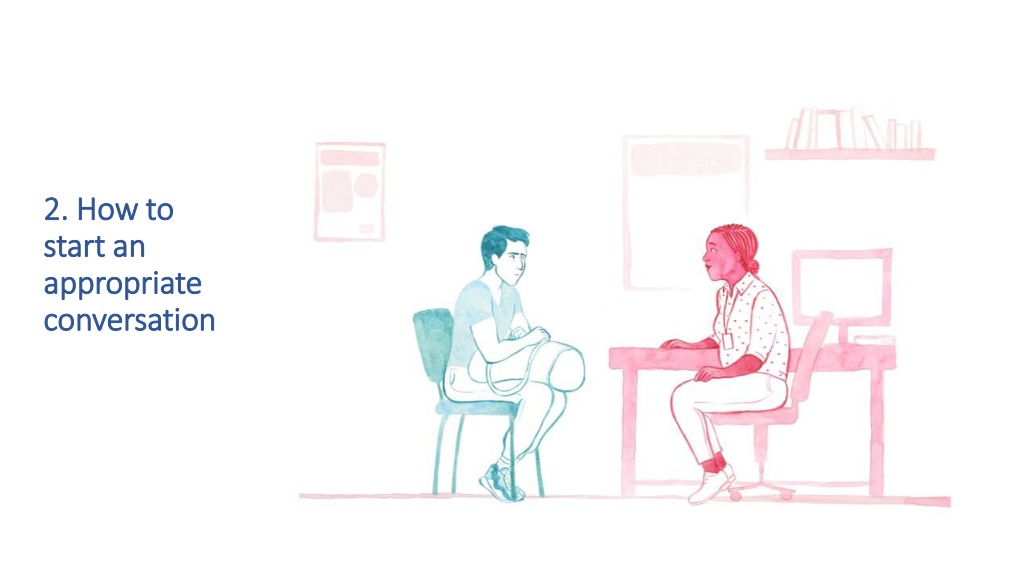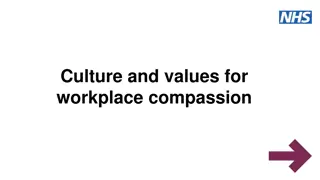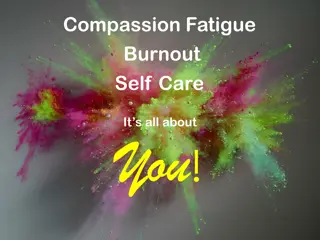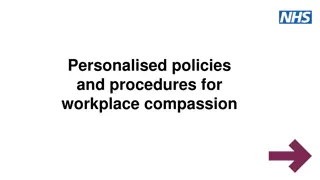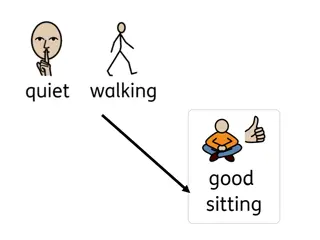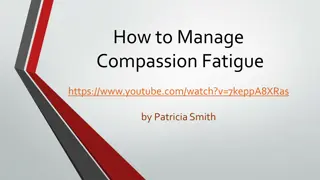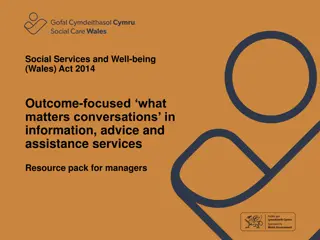Initiating Tough Conversations with Compassion
Initiating a conversation about sensitive topics like eating disorders requires empathy and understanding. Patients may deny or not realize their issues, so starting the conversation sensitively is crucial. By providing support, asking relevant questions, and encouraging change talk, healthcare professionals can guide patients towards seeking help and starting their journey to recovery.
Download Presentation

Please find below an Image/Link to download the presentation.
The content on the website is provided AS IS for your information and personal use only. It may not be sold, licensed, or shared on other websites without obtaining consent from the author.If you encounter any issues during the download, it is possible that the publisher has removed the file from their server.
You are allowed to download the files provided on this website for personal or commercial use, subject to the condition that they are used lawfully. All files are the property of their respective owners.
The content on the website is provided AS IS for your information and personal use only. It may not be sold, licensed, or shared on other websites without obtaining consent from the author.
E N D
Presentation Transcript
2. How to 2. How to start an start an appropriate appropriate conversation conversation
Animation: It can be very frightening to expose the thing you might be very ashamed of Starting a conversation can be a powerful way to support your patient. They may be attending to address their eating disorder, or because of a physical health complaint such as gastrointestinal problems, or because of an aspect of their mental health such as depression. It is important that if you are concerned 2.1 How to 2.1 How to start an start an appropriate appropriate conversation conversation that they might have an eating disorder that you speak to them about this. Often people with eating disorders deny or do not realise there is a problem. Eating disorders are often kept secret. Many people who are in recovery agree that breaking the silence in a sensitive way is the right thing to do, even if they did not feel that way at the first consultation and needed to be given more time. Because of the stigma commonly attached to eating disorders as a girls illness men might find it hard to speak about their problems with eating (NICE: 2017 [2020]) The sooner someone can get treatment, the greater their chance of a full and sustained recovery, but if you don t start the conversation, you may not find out. One of the reasons why I was reluctant to seek help was because I thought I'd be judged I guess society had made it a a feminine illness.
Animation: I want first and foremost to be listened to somebody to just hold the space Conversation starters are as individual as any patient and healthcare professional Suggestions are: You seem to be worried/ struggling with your eating Is your eating pattern a worry for you? 2.2 How to 2.2 How to start an start an appropriate appropriate conversation conversation I m here to help as much as I can ; I m here to listen In my experience depression can throw out obstacles and have other underlying causes I think your eating might be adding to that . Further questions: Do you worry a lot about your weight and/or body shape? Maybe too much? Do you spend a lot of time thinking about your weight/shape and what you eat? Does your weight/shape affect the way you feel about yourself? Have you lost control over what you eat/ do you eat in secret/ make yourself sick? Individual questions that may possibly rule out an eating disorder (Cotton, Ball & Robinson 2003): Does your weight/shape affect the way you feel about yourself? -no Are you satisfied with your eating patterns? - yes
Further tips Provide information, avoiding scare tactics . Positively reinforce steps taken so far. E.g. Good that you mention this today and validate anxiety and ambivalence. Avoid expressing your own assumptions but try to elicit change talk the more you can help your patient to verbally state their own reasons for considering change, the better the chance of them making changes. E.g. What has led you to mention this at this time? How is this affecting your life? What problems is it causing? What does it get in the way of? 2.3 How to 2.3 How to start an start an appropriate appropriate conversation conversation Animation: My GP was like .. oh, you'll be fine . Try to understand what has made them seek help and also what makes the man unsure about seeking treatment (e.g. not knowing what the cause of behaviour is / (self)stigma of having a girls illness / low confidence in success / fear of failure / anxiety about change / shame / worry about control being taken away / fear of weight gain / loss of shape / worries about ability to cope without the eating disorder are all common). Help those expressing readiness to attempt change to make small, manageable and achievable goals. Behavioural change is a positive predictor of outcome. Help the person to feel in control, e.g. by providing information about the referral to Eating Disorder Services: It is an opportunity for a discussion, focusing on the current situation with food. An eating disorder specialist can offer advice or follow-up. Provide other information and resources. For local support groups and self-help in England, Wales and Scotland see ED charity Beat-s helpfinder (B-eat: n.d.) My GP was great ... she really knew the local charities, and was like In the meantime, whilst you re waiting on a referral, here s some groups that can help you .
References B-eat (n.d). Helpfinder. https://helpfinder.beateatingdisorders.org.uk/ Cotton, M.-A, Ball, C., & Robinson, P. (2003). Four simple questions can help screen for eating disorders. J Gen Intern Med. Jan; 18(1): 53 56. doi:10.1046/j.1525-1497.2003.20374.x NICE guideline (NG69) (2017 [updated 2020]). Eating disorders: recognition and treatment. https://www.nice.org.uk/guidance/ng69/chapter/Recommendations
